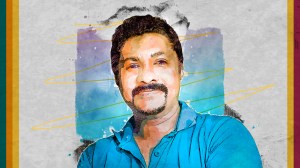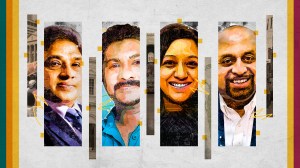In this series

Vicar, St. Paul’s Church, Milagiriya, Colombo
“If you consider a piece of clothing that covers the human body, the entire fabric must be intact. Similarly, unless all segments of society reap the benefit of development, the entire fabric of the nation will not hold good. If a nation is to hold good, all segments of her citizens must hold good. No one can be left behind.”
On Maundy Thursday of this year, a group of Anglican clergy and laity left the building of St Paul’s Church for Galle Face Green park, where those protesting the Rajapaksa government had gathered since the citizen uprising in March.
Clad in their white ceremonial garb, the Christian ministers knelt to wash the feet of a slightly bewildered but obliging crowd, their gestures echoing Jesus’ own act of humility on the night he was betrayed.
Among them was Andrew Devadason, an Anglican vicar at a Colombo congregation. Devadason’s foray into Christian ministry began in 2006 when he started to advocate for the rights of tea plantation workers under the Estate Community Development Mission, a community development program implemented by the diocese of Colombo to empower these marginalized communities.
Devadason described a “tormenting spark for justice” being kindled as he learned of the “modern-day slavery” these descendants of South Indian immigrant workers were caught in. But this mission field was where he also began to develop a threefold strategy in fighting injustice: creating awareness in the society at large, advocating for policy decisions at the state level, and standing in solidarity with the community in need for their legitimate rights.
“The church has the potential to offer a solution,” he said of his advocacy, including his years as a vicar. “The planters and the workers share the same cup at the Eucharist, something unimaginable outside of the church.”
Leading up to the current national crisis, Devadason’s advocacy method had been to “play the catalyst” or “the invisible hand”—that is, doing informal networking with various stakeholders sharing a common goal. This had successfully brought “different political representatives and nongovernmental organizations, civil society movements, and individuals to the same table over a cup of tea to lobby the cause and take it forward.”
This same vision led the clergy and laity to Galle Face Green on Maundy Thursday, hoping to express solidarity with the aggrieved community and to advance their cause peacefully.
But a month later, on May 9, the situation at the frontlines escalated after the leaders received news that supporters of the incumbent party intended to attack protestors. After hearing this information, the clergy headed back out to be with protestors despite the risks involved.
“We had to take the next step—from washing feet to the cross,” said Devadason.
He and his fellow Christian ministers had hoped their religious attire would signal peace and keep the mob at bay, but it was to no avail. The incumbent party supporters beat up Devadason and his fellow clergyman Niroshan de Mel along with the rest of the protestors.
“A national crisis plunges everyone into suffering,” he said. “Our involvement is a practical way of making confession before God of our ignorance of the evil that has been allowed to culminate in our nation.”
And like Moses, who couldn’t resist that spark deep inside that compelled him to stand up for the justice of his people, we too must be compelled to “stand for truth and against the pharaohs of the day.”
“We need lots of prayer and solidarity. The battle is not over yet. There is no zero capacity—for everyone can pray.”













